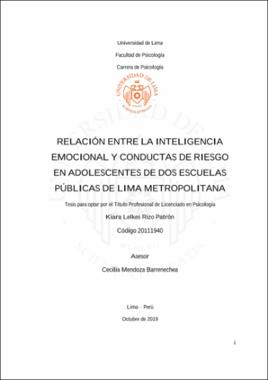Mostrar el registro sencillo del ítem
Relación entre la inteligencia emocional y conductas de riesgo en adolescentes de dos escuelas públicas de Lima Metropolitana
| dc.contributor.advisor | Mendoza Barrenechea, Cecilia Ruth | |
| dc.contributor.author | Lelkes Rizo Patrón, Kiara | |
| dc.date.accessioned | 2020-03-12T13:41:38Z | |
| dc.date.available | 2020-03-12T13:41:38Z | |
| dc.date.issued | 2019 | |
| dc.identifier.citation | Lelkes Rizo Patrón, K. (2019). Relación entre la inteligencia emocional y conductas de riesgo en adolescentes de dos escuelas públicas de Lima Metropolitana (tesis para optar el título profesional de Licenciado en Psicología). Universidad de Lima. | es_PE |
| dc.identifier.uri | https://hdl.handle.net/20.500.12724/10603 | |
| dc.description.abstract | Each year, the numbers of adolescents who begin to participate in risk behaviors at an early age are increased. That is why, the purpose of this research is to determine whether there is a relationship between the components of emotional intelligence and risk behaviors, in adolescents between third and fifth year of high school in Metropolitan Lima. The sample consisted of 153 students (Mage= 15.14, SD=1.13, 46.9% men) selected by non-probabilistic sampling. The inventory of the Emotional Quotient of BarOn ICE and the Confidential Questionnaire of Risk Behaviors were applied. It could be concluded that there is a negative relationship between the interpersonal component and the risk behaviors of tobacco consumption, alcohol consumption and sexual relations. Regarding the intrapersonal component, there was a negative relationship with the age of onset of tobacco use, but a direct relationship with the risk behaviors of tobacco consumption, alcohol consumption, sexual relations and tobacco use of best friends; that is, with greater awareness and expression of one´s emotions, there are more relationships with friends who maintain risky behaviors. Finally, regarding the stress management component, an inverse relationship with respect to alcohol consumption and sexual relations of best friends could be evidenced; this indicates that the better the stress management, the less relationships with peers that present those risk behaviors. However, a more positive relationship with the risk behaviors of tobacco use by best friends, age of onset of tobacco use, frequency of alcohol consumption and age of onset of sexual relations. This research could help the educational centers of Peru give greater importance to the development of students emotional intelligence since they were young, as it could be an important factor for the prevention of the appearance of risk behaviors in adolescents. | en_EN |
| dc.description.abstract | Cada año, se incrementan las cifras de adolescentes que comienzan a participar en conductas de riesgo a temprana edad. Es por ello, que la presente investigación tiene como objetivo determinar si existe relación entre los componentes de la inteligencia emocional y las conductas de riesgo, en adolescentes entre tercero y quinto año de secundaria de Lima Metropolitana. La muestra está constituida por 153 estudiantes (Medad=15.14, DE=1.13, 46.9% hombres) seleccionados mediante un muestreo no probabilístico. Se aplicó el Inventario del Cociente Emocional de BarOn ICE y el Cuestionario confidencial de conductas de riesgo. Se pudo concluir que existe una relación negativa entre el componente interpersonal y las conductas de riesgo de consumo de tabaco, consumo de alcohol y relaciones sexuales. Respecto al componente intrapersonal, hubo una relación negativa con la edad de inicio de consumo de tabaco, pero una relación directa con las conductas de riesgo de frecuencia de consumo de tabaco, consumo de alcohol, relaciones sexuales y el consumo de tabaco de mejores amigos; es decir, a mayor conciencia y expresión de las propias emociones, hay más relaciones con las amistades que mantienen conductas de riesgo. Finalmente, en cuanto al componente manejo de estrés, se pudo evidenciar una relación inversa con respecto al consumo de alcohol y relaciones sexuales de los mejores amigos; lo cual indica que a mejor manejo de estrés, menor relaciones con pares que presentan estas conductas de riesgo. Sin embargo, una relación más positiva con las conductas de riesgo de consumo de tabaco de mejores amigos, edad de inicio de consumo de tabaco, frecuencia de consumo de alcohol y edad de inicio de relaciones sexuales. Esta investigación podría ayudar a que los centros educativos del Perú presten mayor importancia al desarrollo de la inteligencia emocional de los estudiantes desde pequeños, pues podría ser un factor importante para la prevención de la aparición de conductas de riesgo en los adolescentes. Palabras clave: inteligencia emocional, conductas de riesgo, adolescentes. | es_PE |
| dc.description.uri | Tesis | es_PE |
| dc.format | application/pdf | |
| dc.language.iso | spa | |
| dc.publisher | Universidad de Lima | |
| dc.rights | info:eu-repo/semantics/openAccess | * |
| dc.rights.uri | https://creativecommons.org/licenses/by-nc-sa/4.0/ | * |
| dc.source | Repositorio Institucional - Ulima | es_PE |
| dc.source | Universidad de Lima | es_PE |
| dc.subject | Inteligencia emocional | es_PE |
| dc.subject | Riesgo (Psicología) | es_PE |
| dc.subject | Adolescentes | es_PE |
| dc.subject | Emotional intelligence | es_PE |
| dc.subject | Risk-taking (Psychology) | es_PE |
| dc.subject | Teenagers | es_PE |
| dc.title | Relación entre la inteligencia emocional y conductas de riesgo en adolescentes de dos escuelas públicas de Lima Metropolitana | es_PE |
| dc.type | info:eu-repo/semantics/bachelorThesis | |
| thesis.degree.level | Título Profesional | es_PE |
| thesis.degree.discipline | Psicología | es_PE |
| thesis.degree.grantor | Universidad de Lima. Facultad de Psicología | es_PE |
| dc.publisher.country | PE | |
| dc.type.other | Tesis | |
| thesis.degree.name | Licenciado en Psicología | es_PE |
| renati.discipline | 313016 | |
| renati.author.dni | 47695787 | |
| renati.level | https://purl.org/pe-repo/renati/level#tituloProfesional | * |
| renati.type | https://purl.org/pe-repo/renati/type#tesis | * |
| dc.subject.ocde | https://purl.org/pe-repo/ocde/ford#5.01.00 | |
| dc.identifier.doi | http://doi.org/10.26439/ulima.tesis/10603 | |
| ulima.cat | OI |
Ficheros en el ítem
Este ítem aparece en la(s) siguiente(s) colección(ones)
-
Tesis [163]



